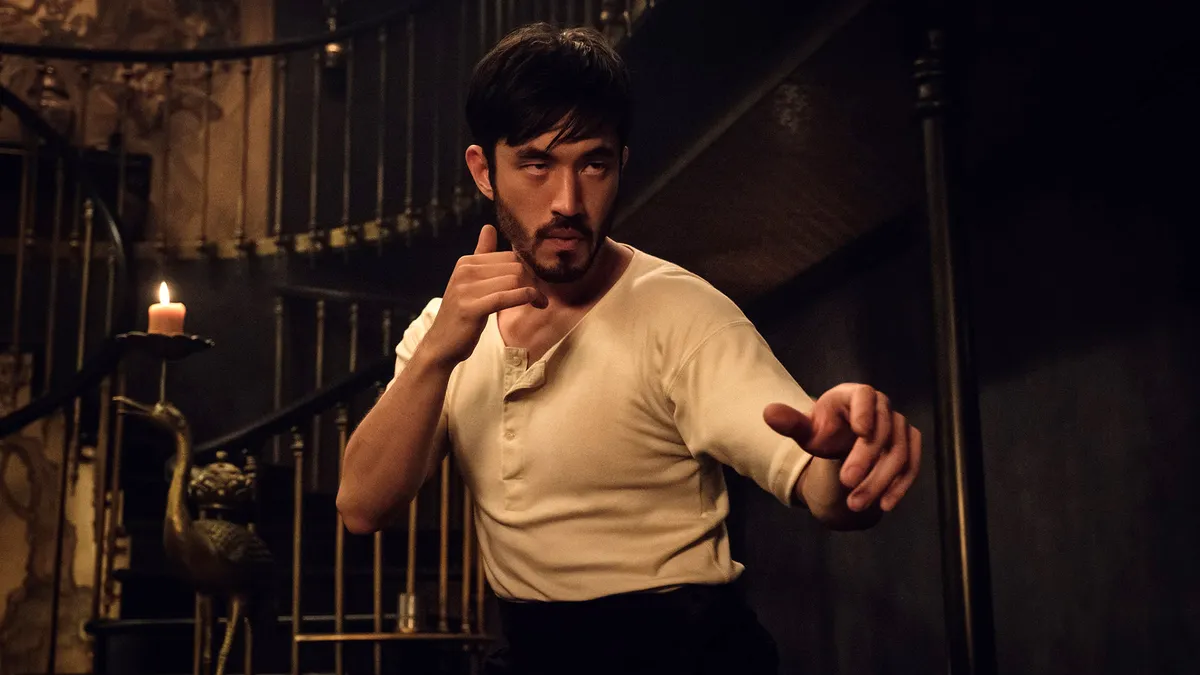It might feel nitpicky to criticize an Asian American show for overlooking the strife of other racial groups, but the absence is noticeable in an ambitious period piece that aims to depict America’s forgotten histories, as well as the scourge of white supremacy. And it’s especially noticeable in 2023, when the narrow focus of “Warrior” feels not unlike the politics of Asian parents whose calls for racial equality have helped bring about the end of affirmative action. Siloing history has an unintended effect of tiering suffering. It also allows groups, driven by their own ethnocentric proclivities, to roll back the progress that others have made.
When the three creators of “Warrior” sought to revive Lee’s project, they focussed on shifting the proposal away from the adventure-of-the-week format that was popular in Lee’s time and creating something more cinematic and prestige TV-like—the kind of thing that would feel at home on HBO. But, by leaving the rest intact, they inherited the blindspots of the classic kung-fu films to which “Warrior” is a loving tribute. Take, for example, the nineties film franchise “Once Upon a Time in China,” which starred Jet Li as a fictionalized Wong Fei-hung, a physician and fighter who defends the Chinese way of life in an ailing Qing dynasty from warlords. Or the “Ip Man” franchise, which follows the story of Bruce Lee’s martial-arts instructor as he fights Japanese occupiers in Foshan during the Second World War, before his forced migration to Hong Kong. Both follow the standard format of kung-fu flicks, by supplying the hero with increasingly challenging opponents whom he must defeat. Each opponent has an advantage over the hero by being bigger and stronger or armed with a unique weapon. But the underdog hero prevails by being smart and remaining composed. These movies, kung-fu westerns, are loosely based around the imperialist scramble to carve up China, and yet it doesn’t really matter what external or systemic factors are leading to societal disarray, as those mostly serve as a backdrop. The only thing that matters is the protagonist’s journey of overcoming his personal challenges. It’s an innocuous if not classic story, but what does prolonged exposure to fictionalized history—or a speculative reality—amount to?
I’ll call it kung-fu politics—a one-sided, regressive vision of the world, developed from action movies. Perhaps the best example is the actor Jackie Chan, who moved the dial in the genre from Qing dynasty kung-fu masters to hero cops. Chan, who won audience’s hearts by playing a goofy and delightful protagonist, would eventually come to represent a singular force for good, both onscreen and in real life. But play the hero police officer too often, and it’s easy to drift into authoritarian thinking. Over the years, Chan has made comments about how “we Chinese need to be controlled,” or else “we’ll just do what we want.” Chan, along with Donnie Yen—the star of a revamped “Ip Man” film franchise—have opposed the pro-democracy protests in Hong Kong, with Chan signing a petition in support of the draconian Chinese security law that was passed to quash the dissent, and Yen calling the dissenters rioters.
“Warrior” wishes to evolve the kung-fu genre, rather than challenge it outright. This is partly done through the show’s fight scenes. In an interview several years ago, Ip Chun, the son of Ip Man, who is in his late nineties and has taken over as grand master for his father, spoke about the inevitability of martial arts moving away from Wing Chun, the style of fighting that his father helped Bruce Lee master. “My thought is that the future society that necessitates the need for violence to resolve an issue will be less and less,” he said. “Someone who emphasizes Wing Chun and relies on it for fighting—like one person fighting nine,” he added, “Well, I say it’s of no help solving society’s problems.” For him, Wing Chun is mostly a “health regimen”—a historically and symbolically rich version of Zumba.
In “Warrior,” martial arts is more than just a health regimen. (Bruce Lee himself, understanding the fantastical nature of action stories, said in 1971 that his show would have to be set in the West: “How else can you justify all this punching and kicking and violence?”) Ah Sahm, in his battles with the Long Zii, often fights alongside the Hop Wei prince, played by Jason Tobin, another mixed-race Chinese British actor, who was born in Hong Kong. Tobin’s character—which is not unlike his character in “Better Luck Tomorrow”—might be best described as “stabby.” He is a stereotype of a kind of pent-up Chinese American aggression. Ah Sahm’s fighting is more thoughtful, elegant, and deliberate. He is a master of Wing Chun, but, as the series goes on, he transitions to Jeet Kune Do, a more efficient and flexible form of mixed martial arts, invented by Lee. (It has been said that the style is the forerunner to the mixed martial arts that is used by today’s U.F.C. fighters.) His movements, a cadence of pulses through his upper torso, with bounces in his shoulders matched by misdirection from his arms and feet, can be reminiscent of a b-boy toprock, a callback to an origin of hip-hop dance.
In both fighting and dance, the body is the main vehicle of expression—ideas, emotions, and history are sublimated into movements that can be explosively deliberate or tranquil. Tropper has talked about how “Warrior” relies on its battle scenes for character development. “I get very into the weeds on the fights, as expressions of the characters and as expressions of what the story is,” he said, in an interview. “Every fight has to tell a story. It can’t just be two guys duking it out.”
“Warrior” likes to switch between elevating action—using it as a way to express key themes—and explicitly nodding to the pulpy seduction of kung fu. It’s a continuation of Bruce Lee’s work: the actor was known for balancing heady ideas while still entertaining audiences with his sheer physicality. But it’s a delicate balance, and, as the show progresses, it becomes harder for the characters to slip their warrior personas on and off. In the third season, a woman encounters Ah Sahm and sees him not as he sees himself—a benevolent outcast finding his path—but as the Hop Wei gangster he publicly presents as. He is practicing shirtless with nunchucks (another Bruce Lee tableau), and the woman sarcastically plays down his prowess. At the end of the scene, she leaves, blushing. Ah Sahm, a little confused, continues training. ♦




 Reply With Quote
Reply With Quote

